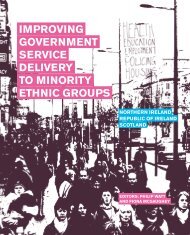4858 Mental Health Report - National University of Ireland, Galway
4858 Mental Health Report - National University of Ireland, Galway
4858 Mental Health Report - National University of Ireland, Galway
Create successful ePaper yourself
Turn your PDF publications into a flip-book with our unique Google optimized e-Paper software.
Collaborative Practice and Policy<br />
problems <strong>of</strong> all kinds in the coming decades, it is necessary to break down the<br />
barriers to effective international collaboration in developing, disseminating, and<br />
implementing science and evidence based prevention and health promotion<br />
programmes, strategies, and policies (Hosman 2000).<br />
A system <strong>of</strong> open co-ordination, in which there are formally established means to<br />
learn from the experience <strong>of</strong> others while taking account <strong>of</strong> national<br />
circumstances, provides an opportunity to promote best practice, increasing<br />
exchange <strong>of</strong> information on what works and what does not, and in what<br />
circumstances (Mossialos et al. 2001). In many cases it will be possible to develop<br />
shared approaches to common problems, but this process must respect historical,<br />
political and cultural diversity and not force the harmonisation <strong>of</strong> processes that,<br />
while pursuing the same goal, are organised in ways that are incompatible with<br />
each other.<br />
In both Northern <strong>Ireland</strong> and the Republic <strong>of</strong> <strong>Ireland</strong> multi-sectoral collaboration<br />
is recognised in the respective health strategies. Strengthening partnerships has<br />
been identified as a strategic objective by the Institute <strong>of</strong> Public <strong>Health</strong> in <strong>Ireland</strong><br />
(1999).<br />
Effectiveness <strong>of</strong> Collaboration<br />
Alliances or partnership initiatives to promote health across sectors, across<br />
pr<strong>of</strong>essional and lay boundaries and between public, private and nongovernmental<br />
agencies, do work, according to Gillies (1998). They work in tackling<br />
the broader determinants <strong>of</strong> health and well-being in populations in a sustainable<br />
manner, as well as in promoting individual health-related behavioural change.<br />
Collaboration can be seen as a ‘good thing’, but there are calls emphasising the<br />
need for evidence <strong>of</strong> its effectiveness (El Ansari et al. 2001). However effectiveness<br />
is a value-laden concept and may be seen as much about perceived cost benefits<br />
as objective indicators (Costongs and Springett 1997). In addition, this type <strong>of</strong><br />
evaluation depends on who is defining the criteria <strong>of</strong> effectiveness (Costongs and<br />
Springett 1997) and the differing interpretations that have been placed on<br />
evaluation (El Ansari et al. 2001). The challenge to provide evidence <strong>of</strong> the<br />
effectiveness <strong>of</strong> health promotion activities in pre-determined outcomes should<br />
not be underestimated. It is a challenge to assemble evidence in ways that are<br />
relevant to the complexities <strong>of</strong> contemporary health promotion, and to avoid the<br />
possibility that this may lead action down a narrow, reductionist route (Nutbeam<br />
1999). Hosman (2000) highlights the need to turn our scientific expertise to<br />
studying the factors that facilitate or impede effective collaboration. If<br />
collaboration is to be successful in making a difference in the lives <strong>of</strong> people,<br />
then increasing the precision and context <strong>of</strong> appraising its effectiveness<br />
will reduce the nature <strong>of</strong> inconclusive evidence and is likely to<br />
improve the practice <strong>of</strong> partnerships, coalitions and joint<br />
working in health and social care (El Ansari et al. 2001).<br />
77
















